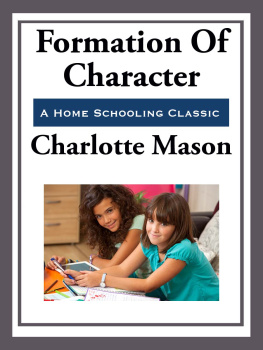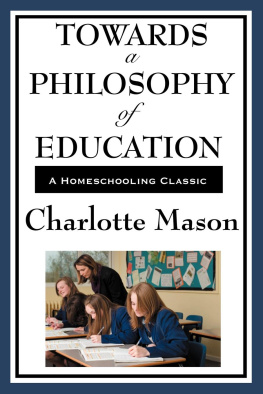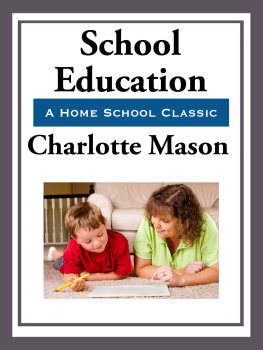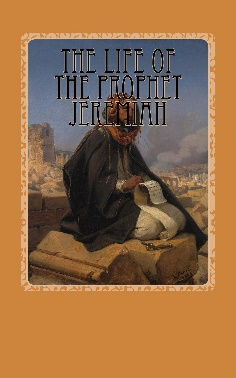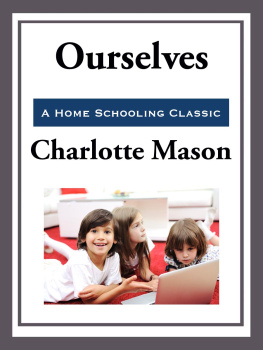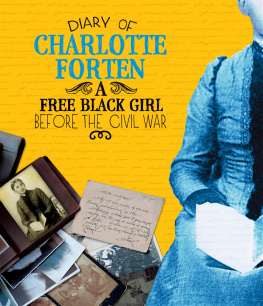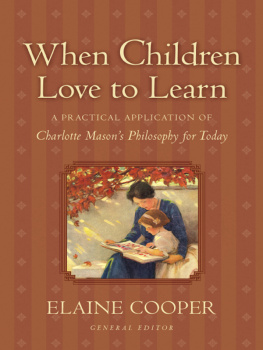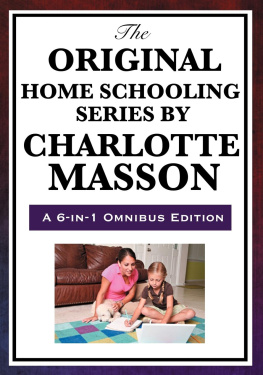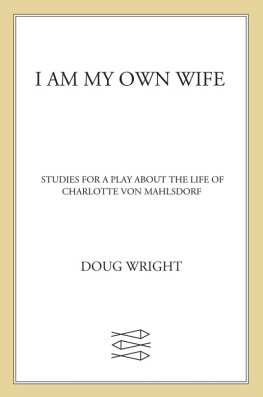Formation Of Character
by Charlotte Mason
Preface to the Home Education Series
The educational outlook is rather misty and depressing both at home and abroad. That science should be a staple of education, that the teaching of Latin, of modem languages, of mathematics, must be reformed, that nature and handicrafts should be pressed into service for the training of the eye and hand, that boys and girls must learn to write English and therefore must know something of history and literature; and, on the other hand, that education must be made more technical and utilitarian these, and such as these, are the cries of expedience with which we take the field. But we have no unifying principle, no definite aim; in fact, no philosophy of education. As a stream can rise no higher than its source, so it is probable that no educational effort can rise above the whole scheme of thought which gives it birth; and perhaps this is the reason of all the fallings from us, vanishings, failures, and disappointments which mark our educational records.
Those of us, who have spent many years in pursuing the benign and elusive vision of Education, perceive that her approaches are regulated by a law, and that this law has yet to be evoked. We can discern its outlines, but no more. We know that It is pervasive; there is no part of a childs home-life or school-work which the law does not penetrate. It is illuminating, too, showing the value, or lack of value, of a thousand systems and expedients. It is not only a light, but a measure, providing a standard whereby all things, small and great, belonging to educational work must be tested. The law is liberal, taking in whatsoever things are true, honest, and of good report, and offering no limitation or hindrance save where excess should injure. And the path indicated by the law is continuous and progressive, with no transition stage from the cradle to the grave, except that maturity takes up the regular self-direction to which immaturity has been trained. We shall doubtless find, when we apprehend the law, that certain German thinkers Kant, Herbart, Lotze, Froebel are justified; that, as they say, it is necessary to believe in God; that, therefore, the knowledge of God is the principal knowledge, and the chief end of education. By one more character shall we be able to recognise this perfect law of educational liberty when it shall be made evident. It has been said that The best idea which we can form of absolute truth is that it is able to meet every condition by which it can be tested. This we shall expect of our law that it shall meet every test of experiment and every test of rational investigation.
Not having received the tables of our Law, we fall back upon Froebel or upon Herbart; or, if we belong to another School, upon Locke or Spencer; but we are not satisfied. A discontent, is it a divine discontent? is upon us; and assuredly we should hail a workable, effectual philosophy of education as a deliverance from much perplexity. Before this great deliverance comes to us it is probable that many tentative efforts will be put forth, having more or less of the characters of a philosophy; notably, having a central idea, a body of thought with various members working in vital harmony.
Such a theory of education, which need not be careful to call itself a system of psychology, must be in harmony with the thought movements of the age; must regard education, not as a shut-off compartment, but as being as much a part of life as birth or growth, marriage or work; and it must leave the pupil attached to the world at many points of contact; it is true that educationalists are already eager to establish such contact in several directions, but their efforts rest upon an axiom here and an idea there, and there is no broad unifying basis of thought to support the whole.
Fools rush in where angels fear to tread; and the hope that there may be many tentative efforts towards a philosophy of education, and that all of them will bring us nearer to the magnum opus, encourages me to launch one such attempt. The central thought, or rather body of thought, upon which I found, is the somewhat obvious fact that the child is a person with all the possibilities and powers included in personality. Some of the members which develop from this nucleus have been exploited from time to time by educational thinkers, and exist vaguely in the general common sense, a notion here. another there. One thesis, which is, perhaps, new; that Education is the Science of Relations, appears to me to solve the question of a curriculum, as showing that the object of education is to put a child in living touch with as much as may be of the life of Nature and of thought. Add to this one or two keys to self-knowledge. and the educated youth goes forth with some idea of self-management, with some pursuits, and many vital interests. My excuse for venturing to offer a solution. however tentative and passing, to the problem of education is twofold. For between thirty and forty years I have laboured without pause to establish a working and philosophic theory of education; and in the next place. each article of the educational faith I offer has been arrived at by inductive processes; and has, I think, been verified by a long and wide series of experiments. It is. however, with sincere diffidence that I venture to offer the results of this long labour; because I know that in this field there are many labourers far more able and expert than I the angels who fear to tread, so precarious is the footing!
But,
if only pour encourager les autres, I append a short synopsis of the educational theory advanced to the volumes of the Home Education Series. The treatment is not methodic, but incidental; here a little, there a little, as seemed to me most likely to meet the occasions of parents and teachers. I should add that in the course of a number of years the various essays have been prepared for the use of the Parents Educational Union in the hope that that Society might witness for a more or less coherent body of educational thought.
The consequence of truth is great; therefore the judgment of it must not be negligent.Whichcote.
1. Children are born persons.
2. They are not born either good or bad, but with possibilities for good and evil.
3. The principles of authority on the one hand and obedience on the other, are natural, necessary and fundamental; but
4. These principles are limited by the respect due to the personality of children, which must not be encroached upon, whether by fear or love, suggestion or influence, or undue play upon anyone natural desire.
5. Therefore we are limited to three educational instruments the atmosphere of environment, the discipline of habit, and the presentation of living ideas.
6. By the saying, Education Is an Atmosphere, it is not meant that a child should be isolated in what may be called a child environment, especially adapted and prepared; but that we should take into account the educational value of his natural home atmosphere, both as regards persons and things, and should let him live freely among his proper conditions. It stultifies a child to bring down his world to the childs level.
7. By Education Is a Discipline, is meant the discipline of habits formed definitely and thoughtfully, whether habits of mind or body. Physiologists tell us of the adaptation of brain structure to habitual lines of thought i.e., to our habits.
8. In the saying that Education Is a Life, the need of intellectual and moral as well as of physical sustenance is implied. The mind feeds on ideas, and therefore children should have a generous curriculum.
9. But the mind is not a receptacle into which ideas must be dropped, each idea adding to an apperception mass of its like, the theory upon which the Herbartian doctrine of interest rests.

